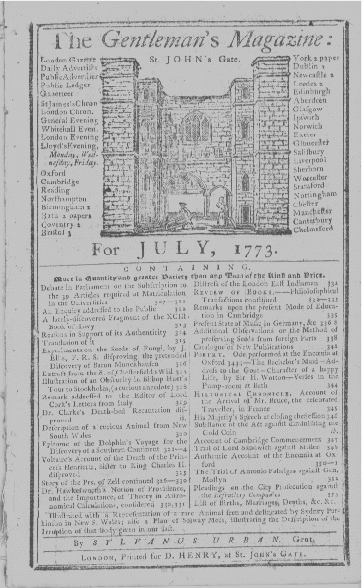Gaspee Virtual Archives Virtual Archives |
|
From The
Gentleman’s Magazine, London, August, 1772 AMERICAN NEWS. On Tuesday, the 9th of June, in
the night, a
number of people unknown boarded his Majesty’s armed
schooner, the Gaspee, as
she lay a-ground on a point of land called Nanquet,
in Rhode island, who
wounded Lieut. William Dudingston, the commander,
and, by force, took him, with
all his people, put them into boats, and landed them
near Pawtuxet, and
afterwards set fire to the schooner, and burnt her
to ashes. This
schooner was stationed as a check to
prevent smuggling, which the inhabitants of Rhode
island think they have a
right to carry on without interruption. The King’s ships are very vigilant on the
American coasts.
About the beginning of June, they spied a shallop
belonging to Chester, laden
with flour and lumber, and maltreated the master,
who complained to the civil
magistrate against the officer, and he was taken
into custody of the sheriff,
but rescued by the Captain of the King’s ship, who
took the writ from the
sheriff, and carried the man off in triumph. |
|
Webmaster addendum for above: This
brief article is noteworthy in the speed in which
the news from America came to
be published in Britain, a mere six weeks was
relatively fast for the time. The snippet of news that follows in the second paragraph may be referring to the case of one Davis Bevan, who was beat up and shackled by Lt. Dudingston and his crew back in 1769 when the Gaspee patrolled the Chesapeake and Delaware River, near Chester, PA. A shallop is a shallow drafted coastal vessel for carrying cargo. We know than Bevans subsequently sued Dudingston, and perhaps the Lieutenant was arrested by the sheriff. Such lawsuits kept the commanders of most of these Royal Navy vessels on their ship, afraid to go ashore themselves out of fear of arrest. See http://gaspee.org/GaspeePriorTo1772.htm and https://issuu.com/dmdeforbes/docs/pva_bridge-spring2015-final-for_web/15 for more details |
| From
The
Gentleman's
Magazine, London, July
1773, p.357-358 AMERICAN NEWS The correspondence
between
the Colonies, which gave Government so much offence
some years ago is
again
renewed. A letter has been read in the Assembly,
at Boston,
inclosing
a resolution of the Assembly of Virginia, to maintain
a correspondence
with the Sister Colonies; which letter and resolution
were almost
unaminously
approved. A Committee is appointed for that purpose,
and instructions
given
to that Committee to inform themselves without delay,
by what authority
a Court of Inquiry was constituted at Rhode Island,
said to be vested
with
powers to transport persons accused of offences
committed in America,
to
places beyond the seas to be tried. |
| Webmaster's
Note for above: This news article is of interest in that it presents a British view of the goings-on in America after the time of the Gaspee Affair, and relates this to the establishment of the permanent Committees of Correspondence. It also gives an accurate assessment of the resentment American colonists felt against British rule. If the London Press could see this, why couldn't the British Government? Thomas Hutchinson, the Crown-appointed Governor of Massachusetts at the time, was well-known to write in favor of rescinding the Charter of neighboring Rhode Island for having too many liberties. The town of Gorham referred to in the column now exists as Gorham, Maine. Maine split from Massachusetts in 1820 as part of the Missouri Compromise. |
|
The
original
complete title was The Gentleman's Magazine:
or, Trader's monthly
intelligencer. Cave's innovation was to create
a monthly digest of news and
commentary on any topic the educated public might be
interested in, from
commodity prices to Latin poetry. It carried
original content from a stable of
regular contributors, as well as extensive quotes
and extracts from other
periodicals and books. Cave, who edited The
Gentleman's Magazine under the pen
name "Sylvanus Urban", was the first to use the term
"magazine" (meaning "storehouse") for a periodical.
Contributions to the magazine frequently took the
form of letters, addressed to
"Mr. Urban". The iconic illustration of St John's
Gate on the front
of each issue (occasionally updated over the years)
depicted Cave's home, in
effect, the magazine's "office". Before
the
founding of The Gentleman's Magazine, there
were specialized journals, but no
such wide-ranging publication (although there had
been attempts, such as The
Gentleman's Journal, which was edited by Peter
Motteux and ran from 1692 to
1694). This news magazine has
approximately 60 pages and the page size is 8 1/4"
x 5 1/4". The magazines were often issued with
several blank back engraved
illustrated plates relating to various subjects in
that particular issue. The
Gentleman's Magazine was in essence the "Time"
or
"Newsweek" news magazine of the 18th and 19th
Centuries. It was also
one of the first general-interest magazines, and one
of the most influential
periodical of its time. |
| Back to Top | Back to Gaspee Virtual Archives |
 Commentary
from Stephen A.
Goldman Historical Newspapers which listed the
August 1772 issue on
eBay in April 2018:
Commentary
from Stephen A.
Goldman Historical Newspapers which listed the
August 1772 issue on
eBay in April 2018: